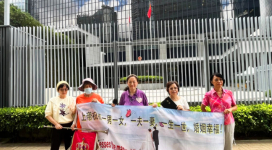Less than one week remains before Sri Lanka's parliament is expected to consider a bill that, if passed, may have detrimental effects on the local Christian community. Already having received approval by the country's cabinet, the bill entitled "The Act for the Protection of Religious Freedom," will be considered on July 20.
Patterned after a bill in Tamil Nadu, India, "The Act for the Protection of Religious Freedom" claims to protect religious freedom by banning “forcible” conversion of religion. However many feel it is attempt by the Buddhist-majority to limit the mission activities of the Christian churches.
According to a report recently released by the World Evangelical Alliance Religious Liberty Commission (WEA RLC), the word 'force' as used in the bill can mean simply to persuade someone to attend prayers of a religion of which they are not a member – for example, a Christian nurse encouraging a sick Buddhist patient to pray with the hospital's Christian chaplain or visiting pastor. If conversion is 'committed' by a group, 'every director or shareholder ... partner, member, employee or officer of that group or company shall be guilty of an offense'. Foreigners found guilty will be expelled and banned from re-entry. Court action against conversion may be initiated by the police, by anybody 'affected or aggrieved by an offense' or by anyone 'interested in the welfare of the public who has reason to believe that the provisions of this Act have been contravened'.
Ratnasiri Wickremanayake, the Minister for Buddha Sasana (Ministry of Buddhist Affairs) who drafted the bill, has also said he will create 'Sanghadhikarana' (informal tribunals run by Buddhist monks) where village disputes can be resolved, without the involvement of the police or courts of law.
"This is most serious," commented Elizabeth Kendal of the WEA RLC. "Last September a gathering of some 1500 Buddhist monks called for a total ban on Christian activity. If 'Sanghadhikarana' were to work in conjunction with MP Wickremanayake's anti-conversion law, then Christians in Sri Lanka would face unrestrained attacks from these extremely militant Buddhist monks. The consequences are unthinkable."
According to the WEA RLC, if the bill is passed, the law will state: 'No person shall convert or attempt to convert another person to another religion, [or] provide assistance or encouragement towards such conversion to another religion.' Effectively, conversion from one religion to another under any circumstance would be a criminal offense.
"The bill obviously is put in place to keep the evangelical Christian church from having any kind of ministry," stated Rody Rodeheaver of the International Needs Network, which runs a ministry for children in the Sri Lankan city of Colombo.
He added, "[The Church] is being driven by the Buddhists who are really in the majority in Sri Lanka. And, the long range goal here is to make Sri Lanka a Buddhist country."
According to Rodeheaver, the Buddhists are threatened by the large number of people turning to Christ in the country. He says the church continues to grow and the Buddhists are responding. "There has been a backlash against the Christian church," he says.
The WEA RLC reported more than 50 violent attacks against Christians and churches in the last six months, as well as 146 Christian places of worship being forced to close between December 2003 – March 2004.
"The very existence of the bill fuels the zeal of the militant Buddhists, legitimizes anti-Christian sentiment and justifies anti-Christian acts," Kendal commented.
Earlier this month, the National Christian Evangelical Alliance of Sri Lanka's (NCEASL), Sri Lanka's main voice of advocacy for religious liberty, and a most significant body for Christian unity and mission, launched a public awareness campaign on the impending legislation, placing their first advertisement in a daily newspaper on Saturday July 3. On that same day the NCEASL office was broken into. According to the Voice of the Martyrs, filing cabinets and desk drawers were all ransacked, with files being systematically searched and then scattered around the room, while only some cash had been stolen. Local Christians believe that the break-in may be related to NCEASL's opposition to Sri Lanka's proposed anti-conversion legislation.
The WEA RLC has asked for Christians around the world to pray believers and the Churches in Sri Lanka in their attempt to promote justice and protect religious liberty.






![[Exclusive] Escaping Extreme Poverty: The True Story of a Ugandan Girl’s Transformed Life](https://www.gospelherald.com/media/cache/thumbnail/7/23/72324sp_273w_150h_1x_1y.jpg)
